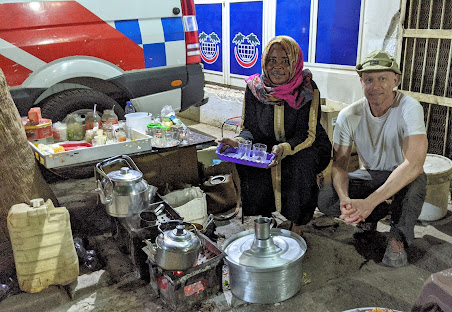 |
| "Our tea lady" and me in Khartoum, November 2020. RJ Peltz-Steele CC BY-NC-SA 4.0 |
As I wrote in 2020, Sudan was on a promising trajectory for peace and normalization of relations with the United States. The Trump Administration settled tort litigation over the 1998 East Africa embassy bombings; the attackers were alleged to have planned the operation from Sudan. And in December 2020, after a secular legal reform, Sudan was at last removed from the U.S. list of state sponsors of terrorism. The State Department instructed that U.S. businesses could again trade there, cautioning only that state-owned Sudanese companies ought be regarded warily, as corruption remained a problem.
I was in Sudan in November 2020, and the people bore a palpable optimism. Khartoum was littered with the worn and abandoned husks of American enterprises, such as KFC, and there was expectation that they would come back to life soon. One could imagine that the ruddy cola sold in glass bottles bearing Arabic script might give way to authentic Coca-Cola, for better and worse. From an eager local entrepreneur, I bought ground Sudanese coffee in haute paper packaging printed in anticipation of a new market for exports.
Now military factions are fighting in the streets of Khartoum. Civilian sites, including hospitals and the airport, are under fire. Ordinary people, struggling with food insecurity and climate-change-related dust storms and flooding in the best of times, are caught in the middle.
My associates and I in Khartoum frequented "our tea lady," who ran a thriving street business near a hospital entrance. With unfailing cheer, she brewed tea and fried snacks over hot coals for healthcare workers and passersby. On the sidewalk, she carved out an unexpectedly welcoming space amid the chaos and grime of the city. In a makeshift circle of motley seating on plastic stools and buckets, people from different walks of life and all corners of the world paused, chattered, and laughed.
I hope our tea lady is safe.